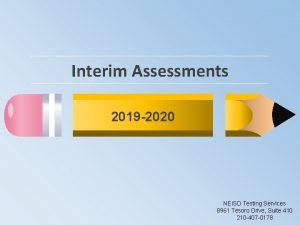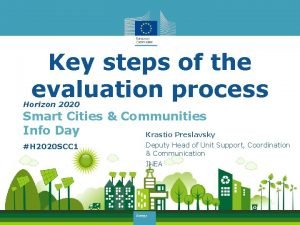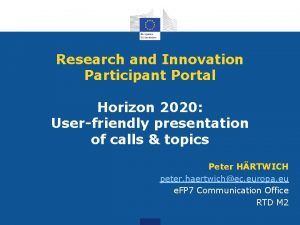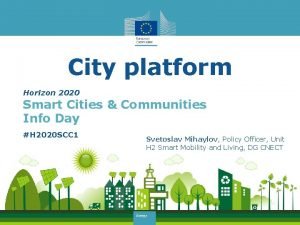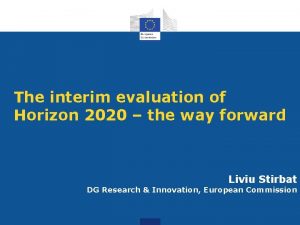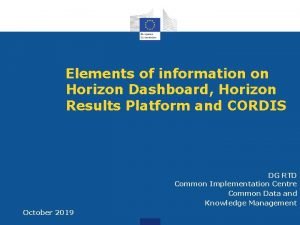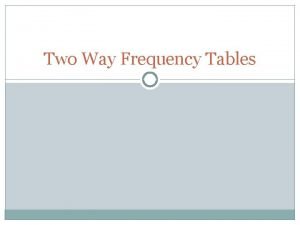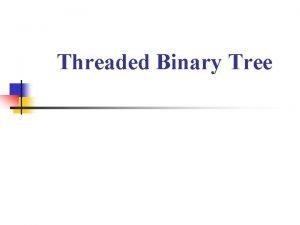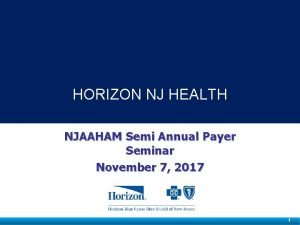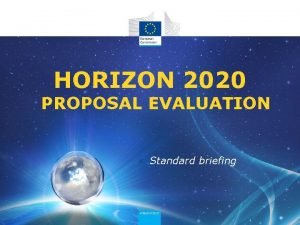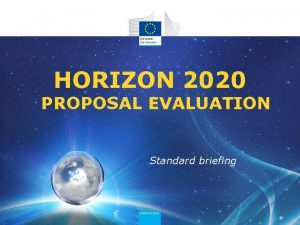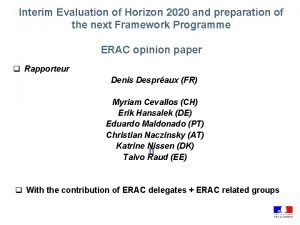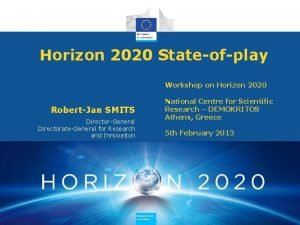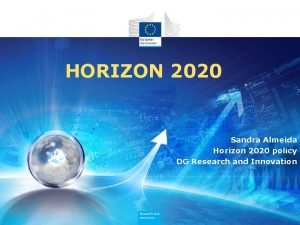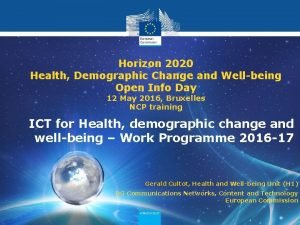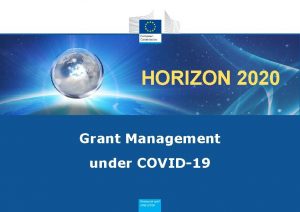The interim evaluation of Horizon 2020 the way











- Slides: 11

The interim evaluation of Horizon 2020 – the way forward Liviu Stirbat DG Research & Innovation, European Commission

BFOR - EU Budget Focused on Results 1. In WHICH areas do we spend? European public goods with higher EU added value of funds 2. HOW do we spend? More leverage of EU funds More simplification efforts 3. How are budget implementation and performance ASSESSED? Rigorous application and further development of our control framework BFOR Relevant for: 4. HOW Annual budget Discharge Mid-term review Post-2020 funding do we communicate ?

BFOR – influence on Horizon 2020 • Performance considerations taken into account in the design and implementation of Horizon 2020: • Flexible: able to focus and refocus on new priorities (e. g. Ebola, Migration) • Simplifications: reduce the administrative burden on beneficiaries/grantees and related costs of participation • Indicators: key elements to better measure the implementation and outcomes

Horizon 2020 – the policy cycle Support new initiatives

Horizon 2020 – Stronger links • Ex-ante impact assessment of Horizon 2020 • Ex-post evaluation of FP 7 • Review of EIT • Mid-term evaluations of JTIs and the Art. 185 s Results/impact • Interim Evaluation of Horizon 2020 • MFF proposal • Ex-ante impact assessment of the next EU FP • Ex-post Evaluation of Horizon 2020 Results/impact

Horizon 2020 – Interim Evaluation • Political context - Legal Requirements (art 32 of the Regulation setting up Horizon 2020 and art. 30 of the Rules for participation) • Better Regulation guidelines – raising the bar: • Effectiveness - do the effects correspond to the objectives? • Efficiency - were the impacts (benefits) achieved at a reasonable cost? • Relevance - do the objectives correspond to the needs? • Coherence - interventions do not contradict others with similar objectives • EU-added value - additional value from EU activities, compared to what could be achieved at other levels

HORIZON 2020 INTERIM EVALUATION PACKAGE 1) Staff Working Document Evaluation results based on legal base requirements and five mandatory evaluation criteria of the Better Regulation Guidelines. 2) HLG report with recommendations 3) Commission Communication • Overall conclusions on the evaluation results. • State of implementation of the FP 7 ex-post HLEG recommendations. • Commission's response to the HLG recommendations on interim evaluation. • It will also cover political messages on art. 185 and art. 187 initiatives.

TIMELINE • Dec 2016: start of the HLG on Horizon 2020 Interim Evaluation • Oct/Dec 2016: on-line stakeholder consultation on Horizon 2020 Interim Evaluation • May 2017: publication of SWD on Horizon 2020 Interim Evaluation • June 2017: publication of Report of High Level Group; stakeholder conference on Horizon 2020 Interim Evaluation • Oct 2017: publication of Commission Communication on Horizon 2020 Interim Evaluation, including art. 185 and art. 187 initiatives

Methodologies EG - context • Evidence-gathering started for: • interim & ex-post evaluation of Horizon 2020 • ex-ante assessment of successor • Previously, focus on: • management, implementation and efficiency • New focus on: • outputs, outcome/results and impacts • New methodologies and measuring techniques needed to help with our wealth of data • altmetrics, mining, Big Data, visualisation, etc.

Methodologies EG – Objectives Develop and apply methodologies to identify: • • Relevance of the specific objectives of Horizon 2020 and their contribution to the Europe 2020 Strategy goals; • • Impact and contribution to tackle societal challenges (as defined in Horizon 2020) through FP 4 -H 2020 by portfolio analysis; • • Success stories with the highest impacts.

Supporting and seeking for impact • liviu. stirbat@ec. europa. eu • ec. europa. eu/research/evaluations/
 Staar interim assessments 2019-2020
Staar interim assessments 2019-2020 Horizon of evaluation
Horizon of evaluation Participant portal h2020
Participant portal h2020 Horizon 2020 2021
Horizon 2020 2021 Horizon 2020 smart cities
Horizon 2020 smart cities Liviu stirbat
Liviu stirbat Horizon europe dashboard
Horizon europe dashboard Toyota way 2020
Toyota way 2020 How to do a two way frequency table
How to do a two way frequency table Two way anova
Two way anova Threaded binary tree definition in data structure
Threaded binary tree definition in data structure Beda one way anova dan two way anova
Beda one way anova dan two way anova
